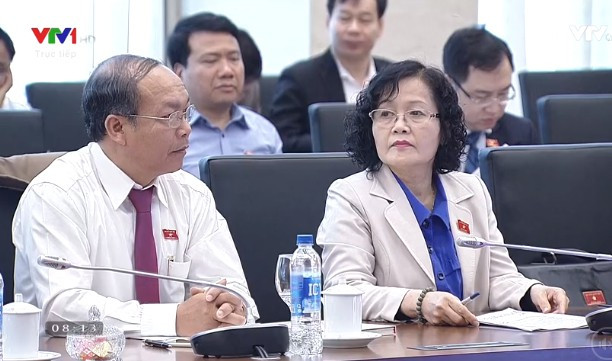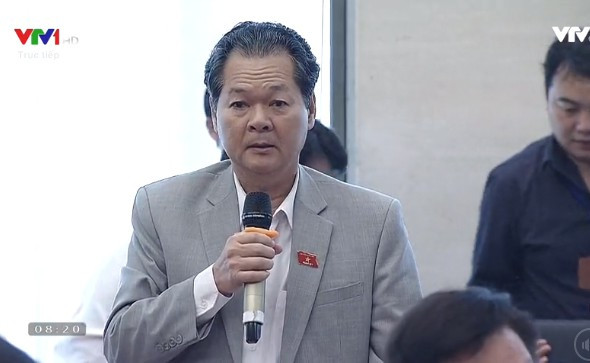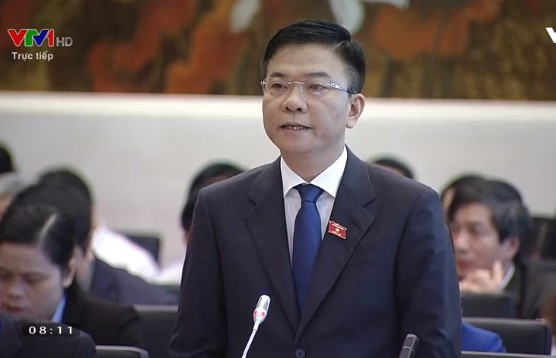Minister of Justice: Unexplained assets of officials must be brought to court
Responding to the question of the Chairman of the Judiciary Committee about the fact that many draft laws presented were not qualified and of poor quality, and the anti-corruption law had to be withdrawn at the last minute, Minister of Justice Le Thanh Long explained that regarding the issue of handling corrupt assets, there was a proposal that for assets of unclear origin, which cannot be explained, a tax of up to 40% should be imposed.
Robots become citizens, the law changes more than ever
The first part of the questioning session,Delegate Tran Thi Quoc Khanh raised the issue that the 4th industrial revolution is affecting every country and every citizen. How does the Minister assess the impact of this on law-making?
 |
| Delegate Tran Thi Quoc Khanh asked the Minister of Justice about the impact of the 4.0 scientific and technological revolution. |
Minister Le Thanh Long confirmed the major changes due to science and technology to legal issues, first of all regarding the subject of law regulation. He analyzed that now, sitting in Vietnam, one can still know what is happening in the US or that in the past, production activities needed to be divided into day and night shifts, but up to now, robots can work day and night without distinction.
So the subjects of law have been very different. Then the birth of artificial intelligence, many inventions and innovations are not only created by humans but can be completely from a machine. In some places, robots have even been recognized as citizens. So, the subjects of law that must be protected have also been different, the rights to information ownership and intellectual property of subjects also need to be placed higher than ever.
This has a big impact, directly affecting the basic principles of law. The Minister of Justice said he has asked Minister of Science and Technology Chu Ngoc Anh to come and talk, introduce more to the officials in the Ministry of Justice to research and apply technology this year to serve the appraisal of the Ministry of Justice's laws. After that, the Ministry will have specific solutions to propose further.
Vice Chairman of the Law Committee Truong Minh Hoang mentioned that the implementation of the law and ordinance development program has not been strictly followed in the past, many laws have been continuously introduced and withdrawn and this is often repeated. Mr. Hoang wants to know, who is responsible for handling this issue?
 |
| Delegate Truong Minh Hoang (Ca Mau) at the questioning session. |
The Minister of Justice affirmed that, first of all, the law-making has made significant progress in recent times, especially after the Law on Promulgation of Legal Documents in 2015 (effective from July 1, 2016). However, Mr. Long also confirmed that, up to now, the situation of requesting to postpone, withdraw, adjust, and supplement draft laws every year has not been resolved.
However, this situation has decreased. In 2016, the number of projects that had to be withdrawn decreased from 11 projects the previous year to 3 in 2017 and only 1 in 2018. Unfortunately, in 2018, the number of draft laws that had to be added to the program increased dramatically, about 10 draft laws.
The reason for this change is that when planning the law and ordinance development program, the agencies did not fully anticipate the developments. For example, the promulgation of the Planning Law alone led to 11 draft laws that had to be amended immediately out of the total 25 draft laws requested by the National Assembly.
In addition, in reality, according to Mr. Long, there are leaders of agencies and sectors who have not paid due attention to building institutions and laws.
To overcome this situation, according to the Minister, it is necessary to proactively review the legal system to ensure feasibility. Next is to proactively evaluate the law. Mr. Long promised to try to clearly express his opinion on whether the bill is qualified for submission or not, and suggested tightening administrative discipline to remind ministries that are slow in this matter.
Unaccountable assets, taxed at 40%?
Delegate Tran Quang Chieu, standing member of the Finance and Budget Committee, acknowledged the efforts of the Minister of Justice over the past two years. However, he also wanted the Minister to clarify the advantages and difficulties after two years of implementing the Law on Promulgation of Legal Documents.
 |
| After each question from the delegates, Minister Le Thanh Long answered immediately within the maximum limit of 3 minutes. |
Minister Long generally assessed that the 2015 Law on Promulgation of Legal Normative Documents was a new step forward to improve the effectiveness of this activity and rectify unsatisfactory points. However, there were some major issues that arose, such as establishing policy assessments.
According to the Minister, the regulation on assessing the impact of draft laws is advanced. If done well, screening from the beginning will bring quality draft laws into the process. However, this law has only been implemented since mid-2016, so changing the mindset of working and advising on law making needs to change gradually.
Therefore, the Ministry of Justice proposed to amend the Law on Promulgation of Legal Documents in 2019 to make it more appropriate. The Ministry of Justice advocates regulating the ultimate responsibility of the agency submitting the draft law.
Chairwoman of the Judiciary Committee Le Thi Nga mentioned that the preparation of draft laws was too slow, affecting the review of the law committees. Some draft laws were only transferred at the end of Friday, and assigned to the Judiciary Committee to work on during the 2-day break, not ensuring progress and quality. Some projects were presented very sketchy, with only half a page of impact assessment, without accompanying data. There were draft laws that only had 1 Deputy Department Head sign with a few lines of "taken because" to agree and approve. Another example is that in the legal records, only 18/27 members of the Government had comments, while 9 members, including important ministries, had no comments, and there were even laws without comments from the Ministry of Justice.
Ms. Nga asked, for that situation to happen, was there any individual disciplined, any Minister, any Department Head or any specialist?
Acknowledging this situation, Mr. Long mentioned the responsibility of the heads of ministries and branches in submitting laws slowly, not ensuring progress and procedures. In fact, the National Assembly has a resolution regulating this matter. In terms of political responsibility, the delay is also a factor for the National Assembly to vote of confidence in those Ministers. For the Government, the regulations are also relatively clear, in the meetings, the Prime Minister requested this very clearly.
Mr. Long agreed to review, remind, and publicly announce the delayed work and outstanding documents. The Ministry of Justice and the Government Office will jointly urge this. That is also the task of the Prime Minister's Working Group.
Regarding the draft law on anti-corruption mentioned by the Chairman of the Judiciary Committee, Mr. Long explained that this is a very difficult draft law. Up to now, there have been different opinions on the consideration to submit it to the National Assembly in the upcoming session (May 2018).
Specifically on the issue of handling corrupt assets, Mr. Long said, there is a proposal to tax assets of unknown origin, up to 40%. "This is the Government's viewpoint and as a member of the Government, I comply with this," Mr. Long said.
Regarding the initial view of the Ministry of Justice on this matter, Mr. Long stated that the Ministry has compared it with international practice, assets that cannot be proven will be confiscated or transferred to criminal proceedings immediately, as China is currently applying, which is confiscation. For Vietnam, according to Mr. Long, applying this regulation immediately is not possible but must follow the judicial process of litigation, similar to considering the seizure of assets without grounds.


